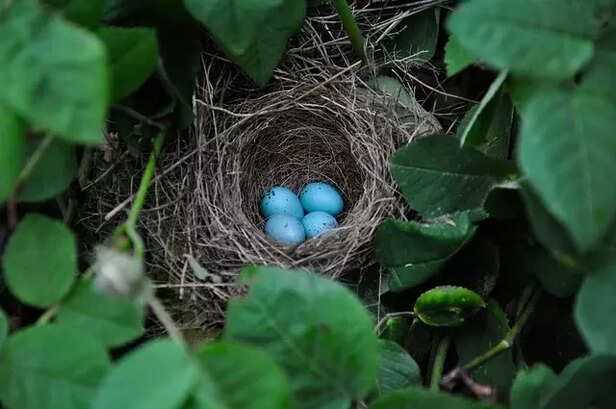Science Behind Birds Rejecting Eggs After Human Contact
Tanisha Kumari | Oct 30, 2025, 11:45 IST
Human touch
( Image credit : Freepik )
Here it explores the science behind why birds sometimes reject their eggs after human contact. Contrary to popular belief, birds generally have a poor sense of smell and do not abandon eggs solely due to human scent. However, physical disturbances, changes in nest temperature and contamination from human skin oils can lead to egg rejection.
Highlights
- Birds have limited olfactory senses and rarely detect human scent as a threat.
- Egg rejection is usually triggered by nest disturbance, poor egg condition or perceived danger.
- Birds are highly sensitive to environmental changes, including temperature.
- Human touch can disrupt egg respiration and increase overheating risks, potentially harming the chick.
Birds lay their eggs carefully in their nests away from human life. Many people have seen that the birds have abandoned their eggs after being touched by humans. The idea is that birds sense danger through their eggs but the story here is a bit more complex. Scientists study how birds react to human scent and touch.

Birds may have a strong sense of sight and hearing but they do not have a strong nose like dogs. Most birds rely on their memories of the nest, the status of their mate and the time of day to keep the eggs safe. A small change like a new scent, can catch a bird’s attention. Still, smelling alone is rarely the main reason for an egg being abandoned.
Some

There are a few reasons why a bird might reject or move its eggs.
Birds Notice Something's Off

Birds notice small changes in their home. They watch how the eggs feel and how warm the nest is. If something is off, a bird might peck at the egg, roll it or push it away from the nest. Some birds can sense vibrations in the eggshell through the air or the ground. Even if humans do not smell a threat, the bird may feel nervous because a hand touched the egg or the nest. This feeling can lead to the egg being abandoned or removed.
Touching eggs can disturb the baby birds that grow inside. The oils in human skin can coat the shell and change how the egg breathes. This can slow growth or harm the chick. In hot weather the nest can warm quickly and touching it can raise the risk of overheating. Even a gentle touch might change the scent a bird uses to protect its eggs. For these reasons, experts advise not to touch nests when you see eggs. Leave the nest alone and give it space.
Celebrate the bond with your pets, explore Health & Nutrition, discover Breeds, master Training Tips, Behavior Decoder, and set out on exciting Travel Tails with Times Pets!
Frequently Asked Questions (FAQs)
Birds Don’t Smell Human Scent

human scent
( Image credit : Pexels )
Birds may have a strong sense of sight and hearing but they do not have a strong nose like dogs. Most birds rely on their memories of the nest, the status of their mate and the time of day to keep the eggs safe. A small change like a new scent, can catch a bird’s attention. Still, smelling alone is rarely the main reason for an egg being abandoned.
Some Birds Abandon Their Eggs

Eggs
( Image credit : Pixabay )
There are a few reasons why a bird might reject or move its eggs.
- If the nest is disturbed by a person or animal, the bird may feel the nest is unsafe.
- And if the eggs are in poor condition or the nest is in a bad spot then the parent birds may choose to leave.
- Some birds mistake a healthy egg for a threat and they try to remove it.
- Many birds have an instinct to protect their young by not staying too close to danger. These rules help the parent birds protect the eggs.
Birds Notice Something's Off

Birds Rejecting Eggs After Human Contact
( Image credit : Pexels )
Birds notice small changes in their home. They watch how the eggs feel and how warm the nest is. If something is off, a bird might peck at the egg, roll it or push it away from the nest. Some birds can sense vibrations in the eggshell through the air or the ground. Even if humans do not smell a threat, the bird may feel nervous because a hand touched the egg or the nest. This feeling can lead to the egg being abandoned or removed.
Human Touch Can Still Be Harmful
Celebrate the bond with your pets, explore Health & Nutrition, discover Breeds, master Training Tips, Behavior Decoder, and set out on exciting Travel Tails with Times Pets!
Frequently Asked Questions (FAQs)
- How long can a bird egg survive without the mother sitting on it?
On average, a bird's egg typically survives for several hours to a day or more without the mother sitting on it. - Do birds feel love towards humans?
Birds can form strong emotional bonds with humans, especially in domesticated settings. While not "love" in the human sense, their loyalty and attachment resemble affection. - What bird throws eggs out of its nest?
American Robins are known to throw eggs out of nests. This behavior helps remove parasitic and protect their own offspring.
